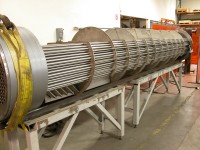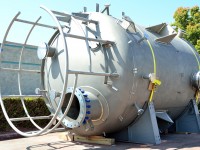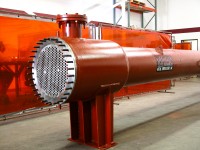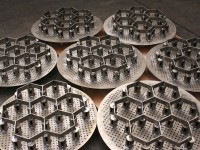One of the major applications of Zirconium is as a corrosion-resistant material of construction for the chemical processing industry. Zirconium exhibits excellent resistance to corrosive attack in most organic and inorganic acids, salt solutions, strong alkalis, and some molten salts. In certain applications of Zirconium, the unique corrosion resistance properties can extend its useful life beyond that of the remainder of the plant. Consequently, maintenance costs are reduced and downtime is minimized. Some of the more important areas in the chemical processing industry where Zirconium is being used include Reboilers, Evaporators, Tanks, Packings, Trays, Reactor Vessels, Pumps, Valves and Piping.
The following chemicals are common types that require Zirconium applications when manufacturing corrosion-resistant process equipment:
- Acetic Acid
- Formic Acid
- Hydrochloric Acid
- Melamine
- Nitric Acid
- Sulfuric Acid
Acetic Acid
Acetic acid is one of the basic components in a wide range of organic materials including acetate esters, acetic anhydride, terephthalic acid, aspirin and other pharmaceuticals. Zirconium is considered the most corrosion resistant material in virtually all acetic acid solutions.
Formic Acid
More corrosive than acetic acid, formic acid is used in the production of pharmaceuticals, dyes and artificial flavors. The leather, textile, rubber, and pulp and paper industries also use formic acid in their process.
Nitric Acid
Nitric acid is one of the most widely used acids in the chemical processing Industry. It is a key raw material in the production of ammonium nitrate for fertilizer, and is also utilized in a variety of manufacturing processes, including the production of industrial explosives, dyes, plastics, synthetic fibers, metal pickling and the recovery of uranium.
Sulfuric Acid

Zirconium 702 Shell and Tube Heat Exchanger Pull-Through Bundle
Sulfuric acid is undoubtedly the most important raw material in the chemical and pharmaceutical industry today. Few chemicals are manufactured without sulfuric acid being involved. It is a strong dibasic acid and can be a reducing acid, an oxidizing acid, and/or a dehydrating agent.
In the chemical industry, sulfuric acid has many diverse applications. The largest quantities are used to manufacture phosphate and nitrogen based fertilizers. The petrochemical sector utilizes sulfuric acid in alkylation and paraffin refining. The inorganic branch of the chemical industry uses sulfuric acid in the production of chromic and hydrofluoric acids, aluminum sulfate and sodium sulfate. The organic arm employs sulfuric acid in the manufacture of explosives, soaps, detergents, dyes, isocyanates, plastics, pharmaceuticals, etc. Wherever one turns today, you’ll encounter products which use sulfuric acid in their manufacturing process.
Many chemical plants use sulfuric acid in one or more process steps and this generally results in severe corrosion problems. Each process has unique minor constituents that can change the way metals corrode. Application of Zirconium has been used very successfully when working with sulfuric acid. The advantage of Zirconium is that corrosion rate will be very small if properly applied and equipment life of over 20 years is expected. Since there is no corrosion maintenance, repair, downtime and replacement costs do not exist and will quickly pay back for the slightly higher initial cost.
Zirconium Fabrications
TITAN regularly designs, engineers and fabricates the following types of Zirconium applications in custom process equipment:
- Zirconium Heat Exchangers
- Zirconium Columns
- Zirconium Condensers
- Zirconium Reactors
- Zirconium Pressure Vessels
- Zirconium Piping Systems
- Zirconium Pipe
- Zirconium Spargers
Zirconium Applications
Zirconium serves many different applications in these industry categories:
- Chemical Process
- Petrochemical
- Oil & Gas
- Pharmaceutical
- Geothermal
- Sea Water
- Water Desalination
- LNG (Liquefied Natural Gas)
- Biomass
- Mining
- Utilities
- Nuclear Power
- Solar Power
Zirconium is very well suited to many industrial processes. The following are some of the environments in which Zirconium is fully resistant*.
|
|
|
For a general guide on corrosion resistance, temperatures and concentrations please see TITAN’s publication, “Corrosion Resistance of Metals in Various Chemical Media” for additional information.*
*Please Note: Final selection of material must be based on actual evaluation of the metal in the corrosive medium under study.
Want to know more?
Zirconium fabrication may be an economical choice for your particular process equipment needs. Consult with TITAN if you have need for unique Zirconium process equipment. We can also quickly help you determine if you should consider another reactive metal. Please contact us by phone at (805) 487-5050 or toll-free (877) 487-5050 or email info@titanmf.com.



